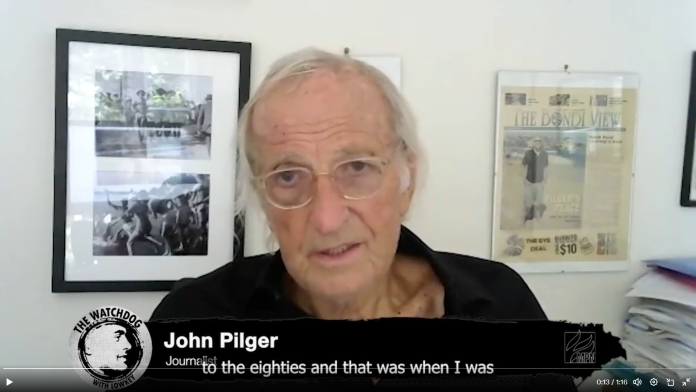John Pilger died on 30th December 2023.
As far back as 1975, a secret file was opened on John Pilger. For the last fifty odd years of his life, his truth-telling had him marked down as a journalist who was a threat to the establishment hegemony. His version of history did not correspond with the stories the establishment wanted told. His truth exposed their lies.
T-shirts now depict exactly what John Pilger revealed about the British establishment’s propaganda.

As one of the most widely regarded and most important journalists and authors of our age, John Pilger was celebrated for his fearless reporting and unflinching dedication to exposing injustice. Over decades of work, Pilger has established himself as a formidable voice against imperialism, inequality, and human rights abuses. His contributions to journalism and literature have not only informed the public but also challenged the powerful narratives perpetuated by governments and mainstream media. However, his uncompromising stance also made him a target of concerted efforts to discredit him, particularly by the UK government and its allies.
Pilger’s career is marked by a commitment to giving a voice to the voiceless. Born in Sydney, Australia, he began his career at the Sydney Sun before moving to Britain in the 1960s, where he joined the Daily Mirror. His reporting from Vietnam during the war brought him international acclaim. Pilger was one of the first journalists to expose the horrors of the My Lai massacre and the broader atrocities committed by the US military. His documentaries, such as “Year Zero: The Silent Death of Cambodia,” revealed the devastating impact of the Khmer Rouge regime and the complicity of Western powers in enabling the suffering of the Cambodian people. These works are not just journalism; they are acts of moral witness.
Pilger’s unrelenting focus on Western hypocrisy often placed him at odds with the establishment. For instance, his documentary “The War on Democracy” explores how Western governments have historically undermined democracies in Latin America to serve corporate and geopolitical interests. By delving into the dark corners of foreign policy, Pilger has consistently challenged the sanitised narratives presented by officialdom. In doing so, he has exposed not only the abuses of power but also the complicity of the media in perpetuating these injustices.
One of the clearest examples of Pilger’s importance as a journalist is his reporting on East Timor. For years, Pilger highlighted the brutal occupation of East Timor by Indonesia, during which hundreds of thousands of people were killed. While many Western governments, including the UK, supported Indonesia’s regime for strategic reasons, Pilger’s relentless reporting brought the plight of the East Timorese to international attention. His efforts contributed to the eventual referendum and independence of East Timor in 1999. This kind of reporting, which combines investigative rigour with moral clarity, underscores why Pilger is a journalist of unparalleled significance.
The UK government’s attempts to discredit Pilger can be traced to his vocal criticism of British foreign policy. Pilger’s investigative work has often highlighted the darker aspects of Britain’s global actions, from its role in the Iraq War to its historical involvement in colonial exploitation. For example, Pilger was a staunch critic of the Iraq War, which he condemned as an illegal invasion based on fabricated evidence. His documentary “Breaking the Silence: Truth and Lies in the War on Terror” dissected the propaganda used to justify the war and exposed the devastating consequences for the Iraqi people. This unwavering criticism drew the ire of British officials and their allies in the media, who sought to undermine his credibility.
The UK government has historically used various means to marginalise dissenting voices like Pilger’s. Leaked documents and testimonies have revealed that individuals within the intelligence community and political establishment viewed him as a subversive figure. By painting him as a radical or conspiracy theorist, these efforts aimed to delegitimise his reporting. For instance, Pilger’s critiques of NATO interventions and his support for WikiLeaks founder Julian Assange have been met with dismissive or hostile coverage in the British press, often parroting government narratives.
A particularly striking example of the UK establishment’s hostility towards Pilger is its treatment of his defence of Assange. Pilger has been a vocal advocate for Assange, arguing that the persecution of the WikiLeaks founder represents a fundamental threat to press freedom. Despite the importance of this issue, Pilger’s advocacy has been misrepresented or ignored by much of the British media, which has often echoed the government’s framing of Assange as a criminal rather than a whistleblower exposing state crimes.
These efforts to discredit Pilger are part of a broader pattern of suppressing dissenting voices that challenge hegemonic power. Pilger’s work threatens the status quo because it compels audiences to question the narratives they are fed by governments and mainstream media. By exposing the contradictions and hypocrisies of power, Pilger empowers citizens to demand accountability. This is precisely why his work remains so vital and why attempts to silence him have been so persistent.
Before he died, John Pilger responded to the revelations that he had been targeted by the British establishment:
"When I read this many years later, I can only laugh…."
— Lowkey (@Lowkey0nline) December 5, 2022
Veteran journalist John Pilger reflects on being tracked by a secretive intelligence and propaganda unit within the British Foreign Office, the Information Research Department (IRD). pic.twitter.com/19966MYrP1
“Some of the documents on me go back to the eighties—and that was when I was reporting from Southeast Asia, Cambodia, and Vietnam.
“My reporting, which was really exclusive, was telling people something that they didn’t know; it was exposing a great deal; it was exposing the tyrants, but it was also exposing who was backing the tyrants secretly—it’s rather embarrassing.”
John Pilger’s enduring legacy lies in his ability to combine rigorous journalism with a deep sense of moral purpose. His reporting has not only informed but also inspired movements for justice around the world. Despite the efforts of the UK government and its allies to undermine him, Pilger’s work stands as a testament to the power of truth-telling in the face of oppression. As a chronicler of injustice and a champion of the oppressed, Pilger’s contributions to journalism and literature will continue to resonate for generations to come, and there is nothing the establishment can do about, no matter how hard they try.







